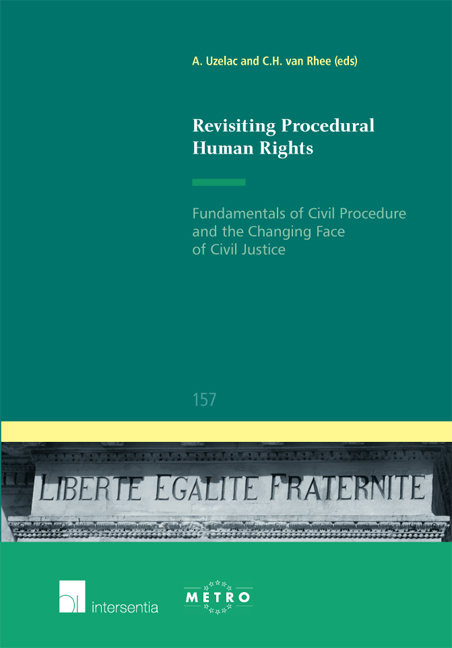 Revisiting Procedural Human Rights
Revisiting Procedural Human Rights from Fundamental Procedural Rights from a National Angle
Published online by Cambridge University Press: 13 October 2018
Introduction
It is fair to say that the Chinese civil justice system is one of the most efficient judicial systems in the world. According to recent statistics of the Supreme People's Court, nationwide over 99 per cent of first instance civil cases are disposed of within six months and over 97 per cent of civil appeals are disposed of within three months. Surveys conducted by local courts also support this claim, revealing that the average period from acceptance to disposition of first instance cases is very brief – in many jurisdictions, shorter than two months. According to these findings, Chinese judges have done an impressively efficient job compared to their foreign counterparts. However, when judicial quality is considered (represented by the parties’ attitude towards judicial decisions), reality presents a much different picture. Every year, tens of thousands of complainants who have lost their case or have had their case rejected by the courts try to challenge the court decision after the case has been closed. Many people flock to Beijing to petition and complain through a unique alternative process to formal legal procedure called ‘Xin Fang’ (visits and letters). In this regard, it is accurate to state that the Chinese civil judicial system is currently suffering from a deep crisis of public confidence and poor finality.
The perplexing landscape of China's civil judicial system is in such a state that it appears to be a paradox. On the one hand, justice is not denied, as most justice is not delayed. On the other hand, justice that is delivered speedily by the courts does not satisfy a host of parties in the end. Though there is little evidence clearly demonstrating a connection between speedy adjudication and poor quality decisions, there is no doubt that due process requires sufficient opportunities for participation, and such opportunities require adequate time for parties to have their grievances heard and taken into account carefully. Nevertheless, the judicial policymaking body of the Supreme Court does not seem prepared to improve judicial quality at the expense of slowing down the current rate of the judicial process. They hope to diminish the public's dissatisfaction without making the required changes that may affect judicial efficiency.
To save this book to your Kindle, first ensure no-reply@cambridge.org is added to your Approved Personal Document E-mail List under your Personal Document Settings on the Manage Your Content and Devices page of your Amazon account. Then enter the ‘name’ part of your Kindle email address below. Find out more about saving to your Kindle.
Note you can select to save to either the @free.kindle.com or @kindle.com variations. ‘@free.kindle.com’ emails are free but can only be saved to your device when it is connected to wi-fi. ‘@kindle.com’ emails can be delivered even when you are not connected to wi-fi, but note that service fees apply.
Find out more about the Kindle Personal Document Service.
To save content items to your account, please confirm that you agree to abide by our usage policies. If this is the first time you use this feature, you will be asked to authorise Cambridge Core to connect with your account. Find out more about saving content to Dropbox.
To save content items to your account, please confirm that you agree to abide by our usage policies. If this is the first time you use this feature, you will be asked to authorise Cambridge Core to connect with your account. Find out more about saving content to Google Drive.